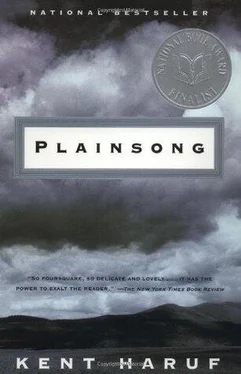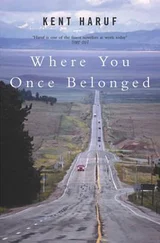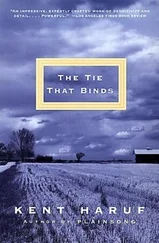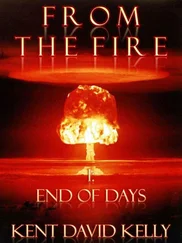Anyway, Ike said, he’s not done with him yet. That’s Dick Sherman’s pickup.
I bet he’s still kicking, Bobby said. Kicking and grunting.
They rode on, pedaling over the loose gravel, past the narrow pasture and the silver poplar and turned in at the drive and left their bikes at the house. They approached the corral but didn’t enter; instead they looked through the fence boards. Elko was on the ground now. Their father and Dick Sherman were standing beside him, talking. He was down on his side in the corral dirt with his neck reached out as if he meant to drink at the barn’s limestone block foundation. They could see one of his dark eyes. The eye was open, staring, and they wondered if the other eye was open too like that, staring blindly into the dirt under his head, filling with it. His mouth was open and they could see his big teeth, yellow and dirt-coated, and his salmon tongue. Their father saw them through the fence and came over.
How long have you boys been here?
Not very long.
You better go back to the house.
They didn’t move. Ike was still looking through the fence into the corral. He’s dead. Isn’t he? he said.
Yes. He is, son.
What happened to him?
I don’t know. But you better go back to the house. Dick’s going to try to find out.
What’s he going to do to him?
He has to cut him open. It’s called an autopsy.
What for? Bobby said. If he’s already dead.
Because that’s how we find out. But I don’t think you want to watch this.
Yes we do, Ike said. We want to watch.
Guthrie studied them for a moment. They stood before him across the fence, blue-eyed, the sweat drying on their foreheads, waiting in silence, a little desperate now but still patient and still waiting.
All right, he said. But you ought to go up to the house. You won’t like it.
We know, Ike said.
I don’t think you do, son.
Well, said Bobby. We’ve seen chickens before.
Yes. But this isn’t chickens.
They sat on the fence and watched it all. For most of it Dick Sherman used a knife with a steel handle, which was easier to clean up afterward, and there wasn’t the problem of a wooden handle’s breaking. It was a sharp knife and he began by stabbing it into the horse’s stomach and working it sawlike along his length, sawing up through the tough hide and brownish hair and pulling with his other hand to open the cut wider. When the knife grew slippery with blood he wiped it and his red hands on the hair over the ribs. Then the yard-long incision had been made and Dick Sherman and their father began to peel back the hide, their father pulling the upper flap of skin and hair backward while Sherman shaved at it underneath, freeing the hide from the ribs and stomach lining, exposing a thin layer of yellow fat and the fine sheaf of red muscle. Dick Sherman was kneeling at the horse’s stomach with the knife and their father was crouched over his back. Both men had begun to sweat. Their shirts showed darker along the back and their faces shone. But they paused only briefly, routinely, to wipe their forearms across their shining foreheads, then fell to work again over the prone horse, whose one visible eye, as far as the boys could determine from the fence, had not changed at all but was still wide open, still staring indifferently into the blank featureless sky above the barn as if he didn’t know or didn’t care what was being done to him, or as if he had decided at last not to look anywhere else ever again. But Dick Sherman wasn’t finished yet.
He drove the knife into the groin inside the top back leg to cut through that big muscle so he could sever the tendon in the joint. Afterward, with their father’s help, the leg could be pulled back away, leaving the gut exposed and accessible. It took a while, stabbing and probing, to find the tendon and then to free the joint, but he found it finally.
Try it, Sherman said. See can you pull his leg back, Tom.
Their father took Elko at the back cannon and pulled hard, wrenching it, carrying the long fine-boned leg back and up so that it stood up now into the air almost perpendicular to his body, awful-looking, horrible. Sitting on the fence, watching it, the boys began to understand that Elko was dead.
The rich muscle at his groin where Dick Sherman had opened him lay thick and heavy and raw, exposed to view like steak. The hide had torn some when their father pulled and was bleeding along the tear. But now the gut could be opened. Sherman cut into the stomach lining. Then the yellow bags and the blue knots of stuff spilled out onto the dirt and the wispy manure. There was mucousy blood and fluid, yellow- and amber-colored. The transparent membranes shone silver in the sun.
Sherman said, Have you got a tree trimmer handy, Tom? I could use one.
In the barn, Guthrie said. He stood up stiffly and walked along the side of the barn into the dark center bay and returned with the two-handled double-clawed tool he used to cut tree branches and the spirea bushes around the house. He handed it to Dick Sherman.
Sherman laid his knife down. Pull the hide back again, will you? he said.
Their father crouched over the horse and with both hands pulled the hide back away from his ribs. Then Dick Sherman began to cut through the ribs with the tree trimmer, one rib at a time, making a crack each time like a dry stick breaking; he was exposing the chest cavity. The boys understood then that the horse was dead completely. He couldn’t live through that. Watching it, their eyes grew round in their heads and their faces paled. They sat utterly still on the fence.
When enough of the ribs had been cut through, their father pulled the loose flap of the chest wall back so that Dick Sherman could examine the heart and lungs. He lifted them in his hands, turning them, poking and exploring with the knife. There was nothing wrong with the heart. Nor with the lungs. He probed with the knife into the aorta and large veins to look for scar tissue from worms but there wasn’t any; the horse had been thoroughly wormed. So he moved back again to the gut and raised the entrails, reaching into the stomach and lifting out more of the moist yellow intestines. He was straining hard now, wrenching the heavy insides out of the horse, and apparently more of it was coming than he wanted because he was discarding some of it, searching and lifting at it while it squirmed and tried to fill in, and then he had some of the bowel and it was too big and too dark entirely and he stopped.
There, he said. See that? That big dark part, kind of bluish-black?
Guthrie nodded.
He had a twisted gut. That’s what killed him. Sherman held it up in his hands, displaying it. Below here where it twisted, the gut died. That’s why it’s so black and bloated and off-color. He released the dead intestine and it folded into place among the rest as though it were alive. Poor bastard, he suffered enough.
The two men stood up. Dick Sherman bent and stretched, unkinked his legs and reached his arms over his head, while Tom Guthrie stood behind the gutted horse, looking at the two boys. They were still sitting as before, on the top board of the fence. You boys all right? he said.
They didn’t say anything but merely nodded.
You sure? Maybe you’ve seen enough.
They shook their heads.
All right. The worst part’s over anyway. We’re almost through.
It was past midmorning now. The bright sunlight of a Sunday morning toward the end of April. And Dick Sherman was saying, We need some baling wire, Tom. Or twine. Twine’d be better.
So their father left the corral to enter the barn once more and returned again, with twine this time, two or three long yellow strands of it. Sherman took the twine and began to close Elko’s stomach. Starting under the chest he knifed a hole into the hide and drew the twine through the hole, knotted it, carved another hole opposite the first and pulled the two flaps of hide together, then moved back six inches and did the same, again and again, moving backward, pulling it tight each time, while their father helped to push the rich organs and slick intestines into place, holding them there until the twine was tight. Soon his hands were as red and slippery as Sherman’s. When they had closed Elko’s stomach as well as they could they wound the twine around the top back leg and drew it down again, so it no longer stood up above the horse’s body, and secured it to his other back leg, then they tied some knots and called it good.
Читать дальше







